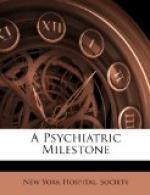Looking back then, you can see how the history of the human thought about what we call mind and psyche displayed some strange reactions of the practical man, the scientist, the philosopher, and theologian toward one of the most important and practical problems. It is difficult to realize what it means to arrive at ever-more-workable formulations and methods of approach. We do not have to be mind-shy or body-shy any longer. To-day we can attack the facts as we find them, without that disturbing obsession of having to translate them first into something artificial before we can really study them and work with them. Since we have reached a sane pluralism with a justifiable conviction of the fundamental consistency of it all, a satisfaction with what we modestly call formulation rather than definition and with an appreciation of relativity, we have at last an orderly and natural field and method from which nobody need shy.
The century that has passed since the inspiration of a few men of the Society of the New York Hospital to provide for the mentally sick has cleared the atmosphere a great deal. We can start the second century freer and unhampered in many ways. Much has been added, and more than ever do we appreciate the position of just such a hospital as that of Bloomingdale as a centre of healing and as a leader of public opinion and as a contributor to progress.
The Bloomingdale Hospital has a remarkable function. It is a more or less privileged forerunner in standards and policies. Without having to carry the burdens of the whole State with its sweeping and sometimes distant power and its forced economy, a semiprivate hospital like Bloomingdale aims to minister to a slightly select group, especially those who are in the difficult position of greater sensitiveness but moderate means in days of sickness. It serves the part of our community which more than any other sets the pace of the civilization about us—the intelligent aspiring workers who may not have reached the goal of absolute financial independence. It creates the standard of which we may dream that it might become the standard of the whole State.




